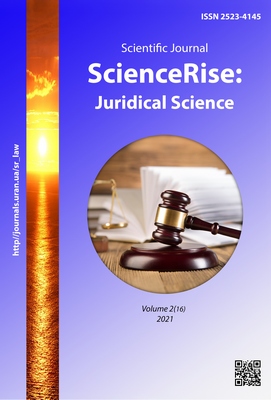Improvement of the constitutional complaint as an instrument of human rights protection
DOI:
https://doi.org/10.15587/2523-4153.2021.235281Keywords:
constitutional complaint, protection of human rights, Constitutional Court of Ukraine, constitutional justiceAbstract
The activity of the European Court of Human Rights is investigated and the significance of the relevant practice of the European Court for the judicial practice of Ukraine is determined. It is emphasized, that a constitutional complaint serves as an effective means of protecting fundamental human rights, strengthening the rule of law and building democracy, which has already been tested in many countries around the world. The article notes that the institution of constitutional complaint significantly expands the possibilities of protecting citizens. In general, this institution is a kind of constitutional appeal, which should be understood as a written petition, submitted to the Court to review the constitutionality of the law of Ukraine (its constitutional provisions), which is used in the final court decision in the case of the subject of a constitutional rights complaint. The author also draws attention to the issues of advantages and disadvantages of a constitutional complaint and a constitutional appeal separately. Thus, one of the advantages of having a constitutional complaint is that the grounds for filing a constitutional complaint are a violation of fundamental human and civil rights. The advantages also include the fact that, unlike a constitutional appeal, which is a mechanism solely for interpreting a certain provision of the law, which excludes the possibility for individuals to apply to a constitutional justice body to declare regulations unconstitutional, a complaint directly provides such a right. However, at the same time, the model of the constitutional complaint, introduced in Ukraine on the subject, is an incomplete normative constitutional complaint, which is related to the consideration of a specific case. After all, according to it, only one type of normative legal act is subject to appeal, a law, and only the one that was applied during the trial of the person. It is stated, that ensuring the possibility of a person to take an active part in the control over the activities of higher state authorities, which is implemented in the relevant legal forms, provides grounds for recognizing a constitutional complaint as one of the modern institutions of democracy. In fact, a constitutional complaint is an effective procedural means to protect the fundamental rights and freedoms of citizens
References
- Zvit z monitorynhu diialnosti Konstytutsiinoho Sudu Ukrainy shchodo rozghliadu konstytutsiinykh skarh (2020). Pidhotovleno za pidtrymky Prohramy USAID «Nove pravosuddia». Available at: https://newjustice.org.ua/wp-content/uploads/2019/07/Zvit-z-monitoringu-diyalnosti-Konstitutsijnogo-Sudu-shhodo-rozglyadu-konstitutsijnih-skarg.pdf
- Maryniv, I. I. (2013). Konstytutsiinyi kontrol u Respublitsi Polshcha. Kharkiv: Pravo, 160.
- Barabash, Yu. H., Selivanov, A. O. (2012). Konstytutsiina yurysdyktsiia. Kharkiv: Pravo, 168.
- Hultai, M. M. (2016). Perspektyvy zaprovadzhennia instytutu konstytutsiinoi skarhy v pravovu systemu Ukrainy. Materialy Mizhnarodnoi naukovo-praktychnoi konferentsii z pytan zaprovadzhennia konstytutsiinoi skarhy v Ukraini. Kyiv: VAITE, 186.
- Vladykin, O. N. (2019). Constitutional complaint institute as a guarantee of human and civil rights and freedoms in Ukraine. Aktualni problemy vitchyznianoi yurysprudentsii, 1, 30–34.
- Pyrohov, V. S., Shchebetun, I. S. (2018). Konstytutsiina skarha ta yii mistse u mekhanizmi zakhystu prav i svobod liudyny. Visnyk studentskoho naukovoho tovarystva DonNU imeni Vasylia Stusa, 10, 55–60.
- Pro Konstytutsiinyi Sud Ukrainy (2020). Zakon Ukrainy No. 2136-VIII. 13.07.2017. Vidomosti Verkhovnoi Rady, 38, st. 279. Available at: https://zakon.rada.gov.ua/laws/show/2136-19
- Pro Rehlament Konstytutsiinoho Sudu Ukrainy (2018). Postanova Konstytutsiinoho Sudu Ukrainy No. 1-ps/2018. 22.02.2018. Available at: https://zakon.rada.gov.ua/laws/show/v0001710-18
- Asotsiatsiia suddiv Konstytutsiinoho Sudu Ukrainy (2019). Available at: http://www.ccu.gov.ua/novyna/u-ksu-obgovoryly-algorytmskladannya-problemy-podannya-ta-mehanizmyzastosuvannya
- The Constitution of Ukraine (1996). Law of Ukraine No. 254k/96-VR. 28.06.1996. Vidomosti Verkhovnoi Rady Ukrainy, 30, st. 141. Available at: https://zakon.rada.gov.ua/laws/show/254%D0%BA/96-%D0%B2%D1%80
- Kosovych, V. (2017). Konstytutsiina skarha i kryterii konstytutsiinosti zakoniv: zahalnoteoretychni aspekty. Ukrainskyi chasopys konstytutsiinoho prava, 1, 39–43.
- Palguna, I. D. G. (2017). Constitutional Complaint and the Protection of Citizens the Constitutional Rights. Constitutional Review, 3 (1), 1. doi: http://doi.org/10.31078/consrev311
- Kuznetzova, U. (2017). Institute of constitutional complaint: theoretical aspects. Visnyk Konstytutsiinoho Sudu Ukrainy, 4, 91–102.
- Horodovenko, V. (2019). Konstytutsiinyi Sud Ukrainy: dosvid rozghliadu konstytutsiinykh skarh. Available at: https://uba.ua/documents/events/2019/20191003/2%20%D0%B4%D0%B5%D0%BD%D1%8C%2C%204%20%D1%81%D0%B5%D1%81%D1%96%D1%8F%20%D0%93%D0%BE%D1%80%D0%BE%D0%B4%D0%BE%D0%B2%D0%B5%D0%BD%D0%BA%D0%BE.pdf
- Chakim, M. L. (2019). A Comparative Perspective on Constitutional Complaint: Discussing Models, Procedures, and Decisions. Constitutional Review, 5 (1), 096. doi: http://doi.org/10.31078/consrev514
- Robocha zustrich holiv konstytutsiinykh sudiv Ukrainy ta Lytovskoi Respubliky (2019). Konstytutsiinyi Sud Ukrainy. Available at: https://ccu.gov.ua/novyna/robocha-zustrich-goliv-konstytuciynyh-sudiv-ukrayiny-ta-lytovskoyi-respubliky-0
Downloads
Published
How to Cite
Issue
Section
License
Copyright (c) 2021 Kamil Prymakov, Yuliia Zakoveria

This work is licensed under a Creative Commons Attribution 4.0 International License.
Our journal abides by the Creative Commons CC BY copyright rights and permissions for open access journals.
Authors, who are published in this journal, agree to the following conditions:
1. The authors reserve the right to authorship of the work and pass the first publication right of this work to the journal under the terms of a Creative Commons CC BY, which allows others to freely distribute the published research with the obligatory reference to the authors of the original work and the first publication of the work in this journal.
2. The authors have the right to conclude separate supplement agreements that relate to non-exclusive work distribution in the form in which it has been published by the journal (for example, to upload the work to the online storage of the journal or publish it as part of a monograph), provided that the reference to the first publication of the work in this journal is included.








